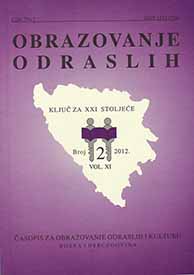Roditeljstvo kao prirodni instinkt ili izgrađena kompetencija: Obrazovne potrebe budućih roditelja u koncepciji općeljudskih potreba
Parenthood as a natural instinct or acquired competence: Educational needs of future parents in the conception of universal human needs
Author(s): Sandra BjelanSubject(s): Social Sciences, Education, Psychology, Adult Education, Family and social welfare, Pedagogy
Published by: JU ‘’Bosanski kulturni centar Kantona Sarajevo’’
Keywords: ferility motivation; educational needs; responsible parenthood;
Summary/Abstract: This work implies the need for rethinking on whether successful parenting is being realised through predetermination i.e. natural instinct or by built i.e. acquired competences. It is necessary to actualise this question considering the fact that parenting today is being performed in new, changed circumstances. The issue of fertility motivation is really a special phenomenon, and given the uniqueness and complexity of human reporoduction the only acceptable research approach is the interdisciplinary one. Since any behaviour is motivated by a certain need, fertility behaviour can be considered through the prism of human needs. Fertility behaviour means to assume new life roles: the role of a mother and a father. Different possibilities of performance increase the complexity of defining motherhood and fatherhood: biological motherhood and fatherhood, medically assisted reproduction, adoption, guardianship, foster care, and often it is not entirely clear who is and who can be considered as a child's parent. As the parent identity is based on parenting practices, and if they should be successful, responsible and in the best interests of the child, it is essential for parents to be competent and to have a certain educational culture. Analysis of the available relevant literature enables a modern approach to review activities, procedures and behaviour patterns which define the quality of parental role, and empirical findings indicate that there are some educational requirements to be met in the process of learning and teaching in order to provide foundation to manage the role of the parent in the best possible way.
Journal: "Obrazovanje odraslih" - Časopis za obrazovanje odraslih i kulturu
- Issue Year: XII/2012
- Issue No: 2
- Page Range: 89-128
- Page Count: 40
- Language: Bosnian

